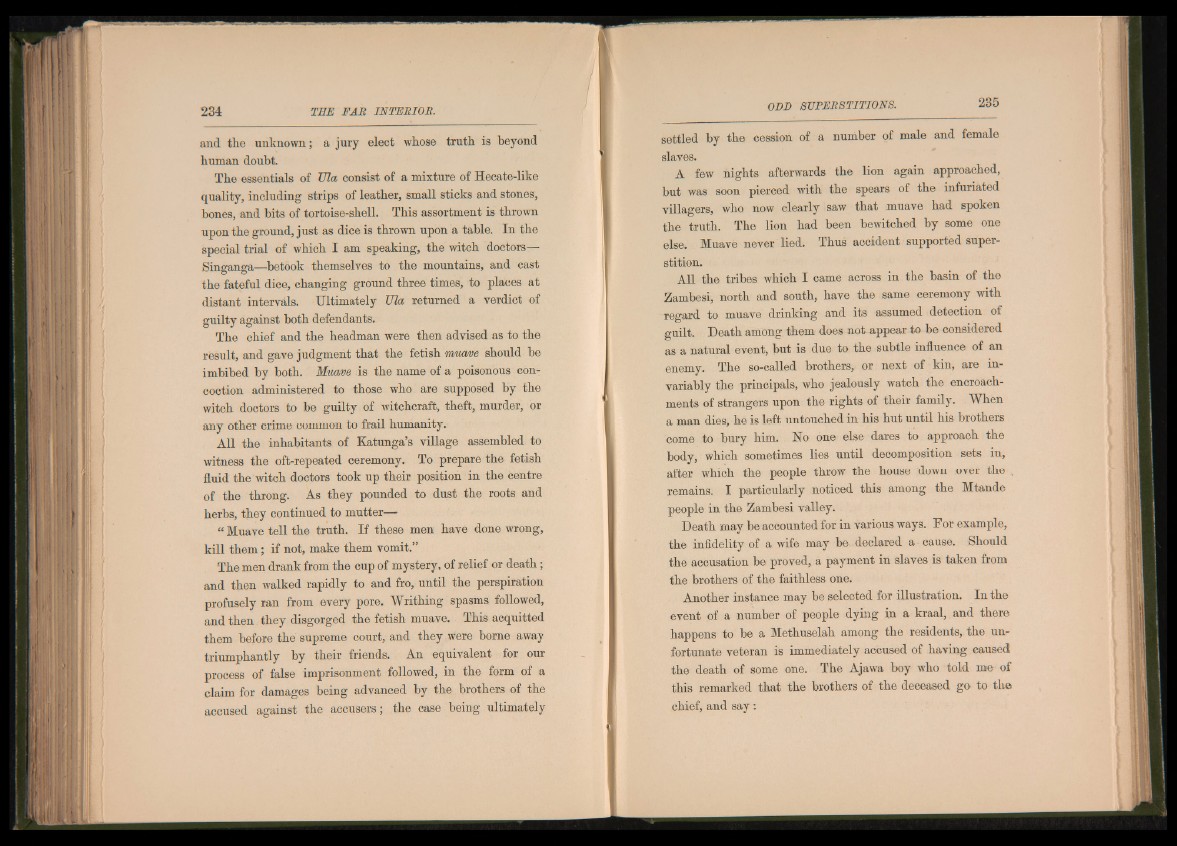
and the unknown; a jury elect whose truth is beyond
human doubt.
The essentials of TJla consist of a mixture of Hecate-like
quality, including strips of leather, small sticks and stones,
bones, and bits of tortoise-shell. This assortment is thrown
upon the ground, just as dice is thrown upon a table. In the
special trial of which I am speaking, the witch doctors—
Singanga—betook themselves to the mountains, and cast
the fateful dice, changing ground three times, to places at
distant intervals. Ultimately TJla returned a verdict of
guilty against both defendants.
The chief and the headman were then advised as to the
result, and gave judgment that the fetish muave should he
imbibed by both. Muave is the name of a poisonous concoction
administered to those who are supposed by the
witch doctors to be guilty of witchcraft, theft, murder, or
any other crime common to frail humanity.
All the inhabitants of Katunga’s village assembled to
witness the oft-repeated ceremony. To prepare the fetish
fluid the witch doctors took up their position in the centre
of the throng. As they pounded to dust the roots and
herbs, they continued to mutter—
“ Muave tell the truth. If these men have done wrong,
kill them; if not, make them vomit.”
The men drank from the cup of mystery, of relief or death;
and then walked rapidly to and fro, until the perspiration
profusely ran from every pore. Writhing spasms followed,
and then they disgorged the fetish muave. This acquitted
them before the supreme court, and they were borne away
triumphantly by their friends. An equivalent for our
process of false imprisonment followed, in the form of a
claim for damages being advanced by the brothers of the
accused against the accusers; the case being ultimately
settled by the cession of a number of male and female
slaves.
A few nights afterwards the lion again approached,
but was soon pierced with the spears of the infuriated
villagers, who now clearly saw that muave had spoken
the truth. The lion had been bewitched by some one
else. Muave never lied. Thus accident supported superstition.
All the tribes which I came across in the basin of the
Zambesi, north and south, have the same ceremony with
regard to muave drinking and its assumed detection of
guilt. Death among them does not appear to be considered
as a natural event, but is due to the subtle influence of an
enemy. The so-called brothers, or next of kin, are invariably
the principals, who jealously watch the encroachments
of strangers upon the rights of their family. When
a man dies, he is left untouched in his hut until his brothers
come to bury him. No one else dares to approach the
body, which sometimes lies until decomposition sets in,
after which the people throw the house down over the .
remains. I particularly noticed this among the Mtande
people in the Zambesi valley.
Death may be accounted for in various ways. For example,
the infidelity of a wife may be declared a cause. Should
the accusation be proved, a payment in slaves is taken from
the brothers of the faithless one.
Another instance may be selected for illustration. In the
event of a number of people dying in a kraal, and there
happens to be a Methuselah among the residents, the unfortunate
veteran is immediately accused of having caused
the death of some one. The Ajawa boy who told me of
this remarked that the brothers of the deceased go to the
chief, and say :